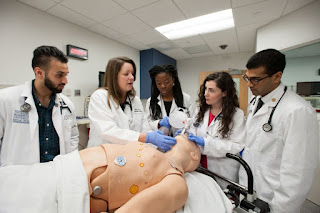Outlining the key competencies of doctors
What does it take to be a doctor? That seems to be a question that has no straight answer, considering that, as the world evolves, so do medicine and medical practices. Dr. Matt Boente, MD, however, attempts to shed light on the matter by sharing a number of key competencies that good doctors have.
 |
Image source: sgu.edu |
Without any exceptions, doctors need to be talented enough, particularly with a high intelligence quotient, in order for them to perform the duties and responsibilities that are expected of them. Doctors don’t go through a number of stringent processes for no reason. Earning an undergraduate degree, passing the MCAT, getting into medical school, and residency training, all serve as instruments that are designed to produce only the best minds in society.
2. Lifelong learning
According to Dr. Matt Boente, MD, doctors are able to survive not only because of their ability to take in knowledge from the books they have read in their training, but because they know how to let new knowledge in, which really is a neverending process. This is the premise of lifelong learning. Doctors live through a world that evolves, where new problems and new solutions arise. Lifelong learning is yet another key competency that a competent doctor should have.
 |
Image source: careeraddict.com |
Being a doctor is not all about having a high IQ, as was discussed earlier. As an individual, whether you are a student or a practicing doctor at this point, you will encounter setbacks and frustrations. You will lose patients to death, which is really tough. You might encounter problems that are seemingly impossible to solve, but you’re put in place as the one to solve them anyway. If you don’t have the emotional capacity to take this in, you will have a very difficult time in your career. A high EQ is indispensable to being a doctor.
Dr. Matt Boente, MD, is a member and an officer at various medical groups, including the American Association for Cancer Research, American College of Obstetrics and Gynecology, American College of Surgeons, American Society of Clinical Oncology, NRG/Gynecologic Oncology Group, the International Gynecologic Oncology Society and the Society of Gynecologic Oncology. For more about his work, visit this page.


Comments
Post a Comment